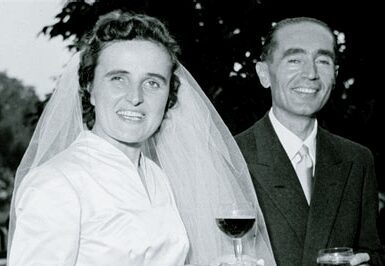Now that the feast of St Valentine is over it is wise to reconnect with the greatest values which make our lives all the more meaningful. One such value is love. When the concept and practice of love has become so much blurred what is exactly the meaning of true love?
Beautiful and true is an interchangeable concept. Hence, I would rather prefer to talk about the beauty of love because when I do so I am also talking about true love. A great teacher in this area is surely Pope Benedict XVI. In a time where relativism has also invaded the great value of love it is all the more important to talk about it with all charity in truth, caritas in veritate. Fully sensible to the hedonistic culture of our time, Pope Benedict gave us the first magnificent gift of his papacy on Christmas day 2005, his first encyclical Deus Caritas Est, God is love. He was bold enough to start this very actual encyclical by looking deeply into the mystery of God. In it he told us: “God is love, and he who abides in love abides in God, and God abides in him” (1 Jn 4:16) (no. 1). Even if this biblical quotation was, for Benedict, a remarkable clarity and the heart of the Christian faith (no.1), he felt the need to articulate it in other contexts and speeches too.
According to the late Pope, true love means risking to love and making out of themselves a gift of love to others. In his message to the Youth of the World on the Occasion of the 22nd World Youth Day, 2007, he told them: My dear young friends, I want to invite you to ‘dare to love.’ Do not desire anything less for your life than a love that is strong and beautiful and that is capable of making the whole of your existence a joyful undertaking of giving yourselves as a gift to God and your brothers and sisters, in imitation of the One who vanquished hatred and death forever through love.
True love is to be found in God who wanted us to exist, live and love like him. In his homily during the Mass which signalled the commencement of his petrine ministry as Bishop of Rome, on Sunday, 24 April 2005, Pope Ratzinger said: Each of us is the result of a thought of God. Each of us is willed, each of us is loved, each of us is necessary. Hence, God’s love in you is necessary because it encourages God’s love in your brother and sister whoever they are and may be found.
Christ, who is the way, the truth and the life (John 14:6), is the one who can change our heart in his eternally loving heart. By befriending him we can become missionaries of his love to the world. When he met with young people at the Plaza de la Paz, Guanajuato, on Saturday, 24 March 2012, as he journeyed in Mexico and the Republic of Cuba, Pope Benedict said: If we allow the love of Christ to change our heart, then we can change the world. This is the secret of authentic happiness.
Returning back to this first encyclical on Christian love, Deus Caritas Est, Pope Benedict tells us that love is the only light that exists and since we were created by God who loves us we can put it into practice. Love is the light—and in the end, the only light—that can always illuminate a world grown dim and give us the courage needed to keep living and working. Love is possible, and we are able to practise it because we are created in the image of God (no. 39). In other words, true love is calling us to be its missionaries around the globe so that God’s light might re-enter our world. A really interesting and challenging but refreshing task to undertake and subscribe to!
Obviously, love can only grow in us if we practice it, first by accepting it as God’s gift to us in making us one with him and also in unifying us as his children and making us also brothers and sisters to each other. This simple principle ought to be remembered as we inhale and exhale every breath into the lungs of who we are. Once more, Deus Caritas Est reminds us: Love grows through love. Love is “divine” because it comes from God and unites us to God; through this unifying process it makes us a “we” which transcends our divisions and makes us one, until in the end God is “all in all” (1 Cor 15:28) (no. 18).
In Pope Benedict’s reflection communion fosters more communion of thought and feelings. Thus the more we let God make us one with him the more we experience this unity with his will. In Deus Caritas Est he reminds us of this powerful dynamic of true love when he writes: The love-story between God and man consists in the very fact that this communion of will increases in a communion of thought and sentiment, and thus our will and God’s will increasingly coincide: God’s will is no longer for me an alien will, something imposed on me from without by the commandments, but it is now my own will, based on the realization that God is in fact more deeply present to me than I am to myself. Then self- abandonment to God increases and God becomes our joy (cf. Ps 73 [72]:23-28) (no. 17).
True love is the compass in our life storms. Amid the darkness and harshness of reality true love keeps emerging as the only alternative to remember it in difficult situations and, in doing so, it helps us put our complete trust in Jesus, the One who really loves you and me. In his book Jesus of Nazareth: From the Baptism in the Jordan to the Transfiguration Pope Benedict wrote: If you follow the will of God, you know that in spite of all the terrible things that happen to you, you will never lose a final refuge. You know that the foundation of the world is love, so that even when no human being can or will help you, you may go on, trusting in the One that loves you.
Is this not what the world of today desperately needs, namely to reclaim Christ’s centrality and primacy in the people’s lives? By reading and meditating on these spiritual gems of wisdom and spirituality I am gently led to conclude with St Paul: Who shall separate us from the love of Christ? Shall tribulation, or distress, or persecution, or famine, or nakedness, or peril, or sword? As it is written, “For thy sake we are being killed all the day long; we are regarded as sheep to be slaughtered.” No, in all these things we are more than conquerors through him who loved us. For I am sure that neither death, nor life, nor angels, nor principalities, nor things present, nor things to come, nor powers, nor height, nor depth, nor anything else in all creation, will be able to separate us from the love of God in Christ Jesus our Lord (Rom 8:35-39).What a magnificent logic true love has in God through Jesus Christ! How worth it is to receive it, practice it and give one’s life to obtain it in its fullness!





























